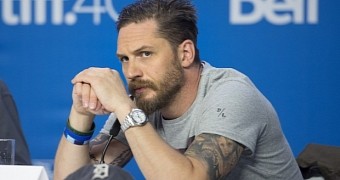Tom Hardy is not backing down or apologizing for the way he shut down a reporter last weekend at the Toronto International Film Festival 2015, for asking him during a panel for “Legend” whether he was bisexual, like one of the characters he plays in the film. No matter what some media outlets would have you believe, he says, celebrities are just as entitled to their privacy as everybody else.
You can see the exchange in question in the video below, starting at the 28-minute mark. The reporter, who was representing a high-profile gay publication, tried to tie his question to an older comment attributed to Hardy, in which he admitted that he had experimented with men when he was younger, as a way to build experience for his acting.
Hardy was having none of it - and he tells The Daily Beast that he has every reason to have responded this way.
Celebrities have the right to privacy, too
In “Legend,” Hardy plays the Kray twin brothers, real-life mobsters who ruled London in the ‘50s and ‘60s, one of whom was openly gay.
Hardy shot to international fame with Christopher Nolan’s “Inception,” but he had been working and getting praises from critics for a long time before that. However, when “Inception” put him on the map, his alleged older admission emerged in the press and got a lot of traction.
He never addressed the issue directly, but his camp did try to make it look as if his words had been taken out of context. His refusal to engage on the topic, as his popularity grew by the day, made it so that, to this moment, there still are rumors about him being either bi or a closeted gay.
Even if he is, no one should cross the line and ask him that in a public forum meant to promote a film, Hardy tells The Daily Beast. There is a time and place for this discussion, but TIFF 2015 was not it, he continues: this is not something he would ever want to discuss with the media.
“I think everybody is entitled to the right to privacy. There should be elegant ways to approach any topic, and there’s a time and place to approach anything and have a good, common sense conversation about anything. I do think that there’s a responsibility for people to own the way that they speak publicly,” he says. “This doesn’t stop us from being human beings; some things are private. I’m under no obligation to share anything to do with my family, my children, my sexuality - that’s nobody’s business but my own. And I don’t see how that can have anything to do with what I do as an actor, and it’s my own business.”
Let the bloke do his job
The only situation in which Hardy would be having this conversation is if a friend was sitting across from him at the table, he continues by saying. The reporter should have known that he was in no position to try and initiate this discussion, because he has no relationship to Hardy. He is a stranger and must not cross certain lines.
While he understands the need to destigmatize sexuality and thus end discrimination (in Hollywood and in general), he did not ask to be made a poster boy for the movement - so the reporter should not have tried to push him towards becoming one.
Hardy never takes personal questions during the press tours for his movies, whether they’re indies or big budget productions, and regardless of the media outlet he’s speaking to. The reporter should have known that before trying to trick him into discussing something as personal as this.
All he wants is to be allowed to do his job as an actor, like the regular bloke that he is.

 14 DAY TRIAL //
14 DAY TRIAL // 